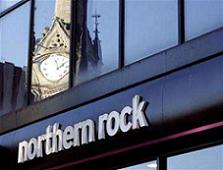Nationalisation
Northern Rock now in public hands
 The nationalisation of Northern Rock has been enshrined in law, the government has announced.
The nationalisation of Northern Rock has been enshrined in law, the government has announced.
The order bringing about the transfer to public ownership was made at 2307 GMT on Thursday - one minute after a parliamentary bill gained royal assent.
It means all shares in Northern Rock have been handed over to the Treasury.
The Banking (Special Provisions) Bill was passed in just three days, after the House of Lords backed down over demands for extra safeguards.
It is the first major nationalisation since the 1970s, when about a quarter of British industry, including coalmining, steel, British Leyland cars, British Airways and energy companies, was in public hands.
In 1984, the stricken Johnson Matthey bank was nationalised for just £1 by a Conservative government to prevent a collapse in the price of gold. It was later sold.
Opposition fears
Transport Secretary Ruth Kelly told the BBC that Northern Rock would be managed at "arm's length" from the government, and she was confident it would eventually be returned to the private sector.
Opposition critics fear it could remain in public hands for a decade or more until the market conditions are right.
The Conservatives wanted a Bank of England-led reconstruction of Northern Rock, while former Chancellor Lord Lawson said it should have been closed to new business and gradually run down.
There is also concern that many of Northern Rock's highest value mortgages will remain in a private offshore trust, Granite, which the Conservatives say will put taxpayers to the back of the queue when it comes to getting their money back.
But Ms Kelly said she was confident that in time the bank could be sold back to the private sector and "every singe penny" would be returned to the taxpayer with interest.
'Domino effect'
She said Northern Rock had entered difficulties because its business model had "failed completely" in the face of "unprecedented" global turbulence.
She told the BBC: "It was on a completely unsustainable growth path... The first thing we had to do was prevent contagion - the domino effect."
The government rushed through legislation to nationalise Northern Rock in three days, with MPs rejecting peers' calls for the bank to be subject to an independent audit, and for it to come under Freedom of Information laws.
The Conservatives said it was a matter of "deep regret" that ministers had opposed these amendments "out of hand".
And Alan Duncan, shadow secretary of state for business, described nationalisation as "a recipe for continued difficulty".
When asked if Chancellor Alistair Darling should resign, he replied: "Yes, I think in due course he's going to have to."
If peers had not backed down, both Houses could have been kept sitting all night as ministers were determined to get the emergency bill onto the statute book by Friday.
Liberal Democrat Treasury spokesman Vince Cable said there had been a "very expensive delay" in deciding to nationalise, but the government had come "to the right decision in the end".
(Published by BBC News, February 22, 2008)